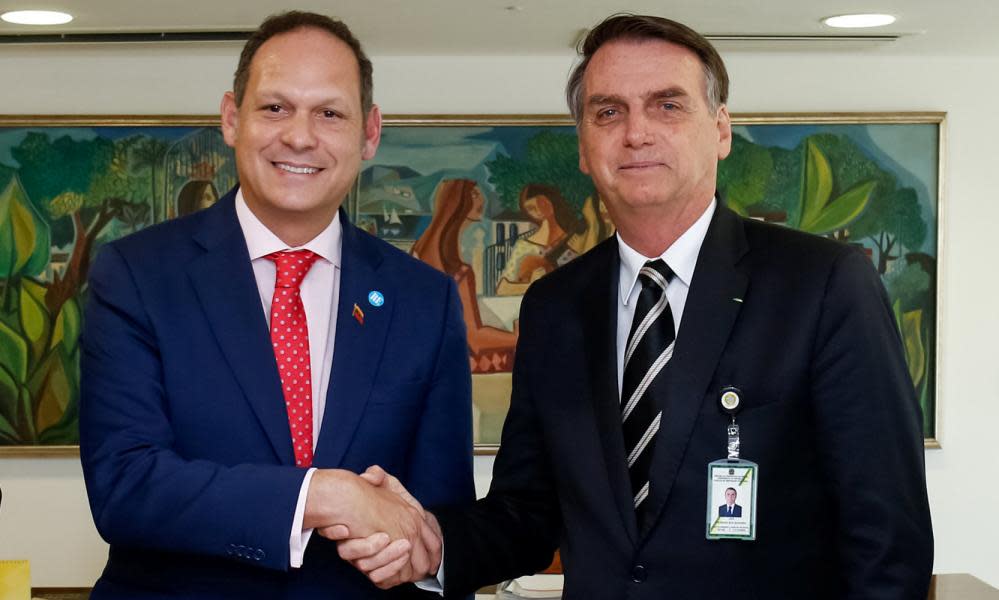Bolsonaro pressures Venezuelan leader with vow to 're-establish democracy'

Brazil’s rightwing president, Jair Bolsonaro, has piled further pressure on Venezuela’s embattled leader, Nicolás Maduro, vowing to do “everything for democracy to be re-established”.
Meanwhile, Bolsonaro’s influential son, who some describe as Brazil’s parallel foreign minister, labelled Maduro a “cancer” that needed to be “excised”.
In a video message to the Venezuelan people ahead of planned anti-Maduro protests next Tuesday, Brazil’s far-right leader pledged his administration would do “everything for democracy to be re-established and so you can live in freedom”.
“I believe the solution will soon come,” said Bolsonaro on Thursday, flanked by Miguel Ángel Martín, one of several exiled Venezuelan opposition leaders with whom he held talks in Brazil’s capital, Brasília.
Brazil’s foreign ministry issued a blistering attack on Maduro, who began his second six-year term as president on 10 January despite a storm of criticism at home and abroad.
Brazil’s foreign ministry claimed Maduro – who took power after Hugo Chávez’s death in 2013 and has led his country into economic ruin – headed an “organized crime apparatus” built on “widespread corruption, narco-trafficking, the trafficking of people, the laundering of money and terrorism”.
Bolsonaro’s son and close confidant Eduardo Bolsonaro tweeted: “Maduro’s narco-dictatorship is a cancer that needs to be excised.”
Eduardo Bolsonaro is a longstanding critic of Maduro and has close relations with rightwing Venezuelan dissidents who seek Maduro’s military overthrow.
The condemnation came as Venezuela’s opposition – suddenly reinvigorated by the ratcheting up of regional pressure by countries such as Brazil and the emergence of a potential new figurehead – prepared to hold a day of demonstrations next Tuesday.
Long moribund, Maduro’s opponents have found a new voice since Juan Guaidó, the young head of Venezuela’s opposition-run national assembly, declared himself ready to assume the presidency as a result of Maduro’s illegitimate rule and received backing from rightwing governments in Brazil, Colombia and the United States.
Guaidó’s profile grew further last Sunday when he was briefly detained by members of Venezuela’s security services – a headline-grabbing incident he claimed highlighted growing desperation within Maduro’s inner circle.
Writing in the Washington Post this week, Guaidó denounced Maduro as a “usurper” and “de facto ruler” whose re-election last May was a “farce”. In the absence of a legitimately elected president, Guaidó argued, it was his constitutional duty to occupy the position on an interim basis until free and fair elections could be held.
He also called on the military – whose members are being offered amnesty by Venezuela’s opposition – to turn on Maduro.
“The chain of command has been broken, and there’s no commander in chief – it’s time to get on the right side of history,” wrote Guaidó, who has adopted Barack Obama’s famous rallying cry “¡Sí, se puede!” – “Yes we can!”

 Yahoo News
Yahoo News 